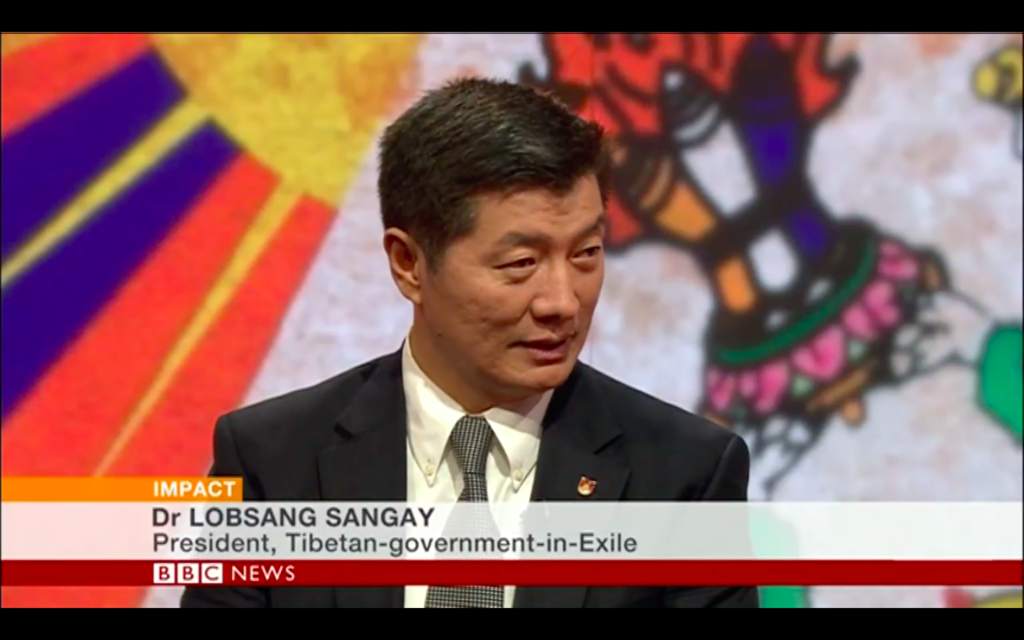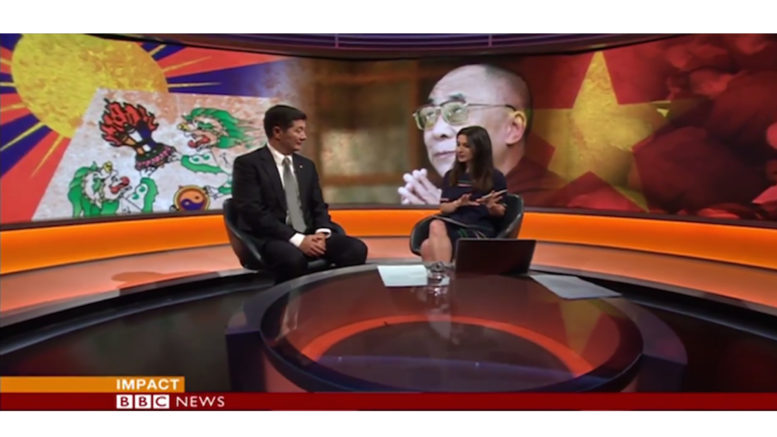The president of the Central Tibetan Administration Dr Lobsang Sangay appeared on the Impact Program of the BBC World with host Yalda Hakim on Thursday, November 23. The interview streamed live touched on various topics concerning His Holiness the Dalai Lama, Tibet and the Tibetan freedom struggle. Below is the full transcript of the interview.
BBC: Chinese government have accused you of creating all sort of trouble within Tibet
Dr. Sangay: Yes. They call me 100 percent separatist, that I have never done anything good for Tibet and Tibetan People. I disagree. But even if they say 99 percent, leave 1 percent room for improvement they have not left that. But all I am doing is advocating the basic rights of the Tibetan people, genuine autonomy within China within the framework of the Chinese constitution. And what we promote is dialogue between the envoys of Dalai Lama and representative of the Chinese government. So this is a very reasonable, non-violent, peaceful way of solving the issue of Tibet.
BBC: Is the dialogue taking place?
DR. Sangay: Unfortunately not. Since January 2010, it has been now more than 7 years there has been no dialogue between the envoys of the Dalai Lama and Chinese representative. And we would like to see that the Issue of Tibet resolve peacefully.
BBC: Because they refuse to meet with you, they won’t talk to you.
Dr. Sangay: I don’t think they will meet with me, at least they should meet with the envoys of The Dalai Lama. You know he is a spiritual leader and he is most revered around the world, and he is very reasonable as well. And I hope President Xi Jinping in his second term will look at Tibet as low hanging fruit because in second term normally they do deal with complicated issues like Barack Obama dealing with Iran and Cuba. Hopefully, President Xi Jinping will you know continue his father’s legacy. His father was very close to Late Panchen Lama, he was very familiar with the Tibet issue. Hopefully you know, Xi Jinping will be like his father.
BBC: China’s growing presence on the international stage, its economic growth and power. Have you found that attitudes globally towards the Tibetan cause has diminish as a result?
Dr. Sangay: Not just Tibetan cause. Generally human rights, democracy, environmental rights, all these discourse are diminished or diluted in all the countries where they have free trade agreement. Now in the 19th Party Congress Xi Jinping has said, Xi Jinping’s thought is socialism with Chinese characteristic in new era which means no liberal democracy, no freedom of speech, no election just one party rule. That is what they are bringing to the table. In new era means the international frontier, international community. So thats the challenge. And hence I have been to Australia, New Zealand, Denmark, Norway just recently and they all don’t want to talk much about Tibet, human right, democracy. This is you know quiet scary because there is lot of self censorship going on.
BBC: Because they are concerned about damaging their relationship with China.
Dr. Sangay: Precisely, but the issue is should we transform China and make them look more like us, liberal democracy, or should we transform to look more like China. Thats the choice. So hence we have to take a principle stand. Of course you must have free trade, you must engage with China, but don’t give free-pass
BBC: A lot of countries have been with this One Belt One Road
Dr. Sangay: Thats true. Don’t give free-pass on human rights. One Belt One Road 60 some countries have subscribed to it. It’s okay. But as far as Tibet is concern, we lost our country after one road. Chinese promised us that this road will lead to prosperity and peace, and we helped them build that road. And Chinese paid us silver coins, in fact they build a silver coin factory in Chengdu. And after the road was completed, trucks came, tanks came, guns came and that’s how our country was occupied. So, One Belt One Road is good, but I think there should be quid pro quo and principled trade based on human rights.
BBC: The Dalai Lama, we are hearing report is saying that he probably won’t travel as much or will probably not travel at all abroad. So much of the hope of the campaigning the cause is now on you.
Dr. Sangay: Now that’s a big shoes to fill. His Holiness the Dalai Lama recently told a group of youth who had come from all over that I will be travelling more on his behalf, but I’ll do so. But His Holiness is very healthy, he will be travelling to various countries around the world and he is the best spokesperson and the best face for the Tibetan cause. I won’t be able to fill in his shoes but he is definitely sharing or giving me more responsibilities and I will do the best I can.
BBC: Lobsang, thank you so much for joining us here on the program and share your thoughts.
Dr. Sangay: Thank you so much Yalda and good to see you again.
Watch the full interview here:

CTA President Dr Lobsang Sangay during the interview with BBC.

